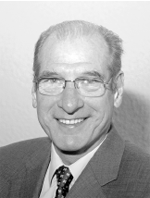Annual Report 2006-2007: On a Journey to Success

A message from the Chairman and the Chief Executive

Prof Thomas Hanahoe
Chairman

David Law
Chief Executive
West Hertfordshire Hospitals NHS Trust, like the whole NHS family, is going through a period of great change. In the past year we have seen more and more patients book appointments at a time and date to suit them, direct from their GPs surgery. More patients than ever are having their surgery as a day case – operations that even a few years ago would have meant a week in bed. The use of new technologies such as the Picture Archiving Communication System – digital x-rays and scans – is transforming the way in which doctors and nurses work and allowing us to provide better patient care.
Last year we highlighted the challenges faced by the Trust and our vision to both face and solve these issues. We began the financial year in a challenging position and have worked tirelessly this year to bring our budget closer to balance and live within our means. We closed the financial year by achieving the financial position agreed with the Strategic Health Authority; a significant step forward for the Trust.
The current year will be equally testing, however the systems and processes put in place during the past 12 months, including improvements in clinical coding, the introduction of monthly divisional financial and operational scrutiny, the establishment of financial trading accounts, together with robust challenge within the Finance and Performance Committee, will set us in good stead for the future as we work towards generating a significant financial surplus in the financial year.
The Trust's performance is monitored against key standards set by the Healthcare Commission, many of which reflect the public desire to have services provided on a timely basis. Against these benchmarks the Trust's waiting times performance has been excellent, including some of the best cancer waiting times in the country and 98% of patients seen within four hours in A&E over the course of the year.
Reaching these standards, alongside a significant reduction in our infection rates for MRSA and Clostridium difficile, whilst at the same time reducing our costs by around £15 million, has not been easy and we hope that the hard work and determination of our staff will be recognised in this year's Annual Health Check by the Healthcare Commission. In October 2006, the management of the Trust's Plastics Surgery service transferred to the Royal Free Hospital, Hampstead, whilst Acute Children's Services, previously managed by the Hertfordshire Partnership NHS Trust, transferred to this Trust.
In July, the East of England Strategic Health Authority was established, followed by, in October, the new West Hertfordshire Primary Care Trust. Excellent working relationships continue to develop.
During the year we have proposed significant changes to the way we provide acute healthcare to our local community. The separation of emergency and planned care will reduce the incidence of hospital acquired infection, result in fewer cancelled operations and allow teams of skilled health professionals to work together in one location, pooling both knowledge and resources. In November, the Board confirmed the decision to centralise acute services at Watford General Hospital in advance of the Watford Health Campus, and decided to locate planned surgery at St Albans City Hospital. Whilst we acknowledge the feelings of anxiety within local communities, we believe that these changes are fundamental to ensuring a strong, vibrant and high quality health service in west Hertfordshire, which is fit for purpose in the 21st century.
In November, the new West Hertfordshire PCT, which is the main NHS funding agency for the Trust, announced publicly that it is satisfied that Watford remains the right place for the further development of major hospital services in west Hertfordshire, and that it continues to support plans to develop the new Watford Health Campus. The PCT together with this Trust and East & North Hertfordshire NHS Trust is currently consulting publicly on the future organisation of Acute Services in Hertfordshire. Following completion of the consultation, a decision about the reorganisation of services is expected in the autumn.
Plans to develop the Watford Health Campus as part of a unique nine-organisation partnership have moved forward at a pace. Following a period of pre-planning consultation, the outline planning application was lodged with Watford Borough Council in July with a decision expected in December 2007.
We welcome the support and ongoing scrutiny of our many 'critical friends'. The Hertfordshire County Council Overview and Scrutiny Committee, local authorities, community-based groups, the Patient and Public Involvement Forum and the Patients' Panel have all played a major role in shaping the way the Trust has worked to plan health services for the future.
Patients are exerting greater influence and choice on how, when and where they are treated and new funding mechanisms (known as 'payment by results') are being introduced. These are important developments for the Trust but they present a real challenge in predicting how many patients will need care in any given period.
The Trust Board believes Foundation Trust* status will allow us further to improve clinical services and become more accountable to our patients, our staff and the local community and we plan to seek FT status in late 2008. To achieve our goal, we must become more business and more patient focused. One thing is certain, these changes will touch every member of staff in some way as we revolutionise the way we provide and deliver healthcare, and bring about greater efficiency and better use of resources. We pay tribute to their ongoing support and dedication, as well as to our volunteers and our many partners and colleagues in the health service and local community.
* NHS foundation trusts are a fundamental part of the current NHS reform programme. They reflect the move from a centrally managed service towards one that is managed locally and is therefore more responsive to patients. They are accountable to local people, who can become members and governors, and are able to decide for themselves what capital investment is needed in order to improve their services. Foundation Trusts are authorised and monitored by Monitor – the Government's Independent Regulator of NHS Foundation Trusts.
Prof Thomas Hanahoe
David Law




